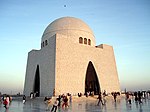Mai Kolachi
| Part of a series on the |
| History of Karachi |
|---|
 |
| Prehistoric period |
| Ancient period |
| Classical period |
| Islamic period |
| Local dynasties |
| British period |
| Independent Pakistan |
Mai Kolachi was a Sindhi Hindu fisherwoman who settled near the delta of the Indus River in the oldest area of Karachi to start a community.[1][2] The village was named after her for her bravery, who jumped into the sea to save her son.[1][3] Kolachi and this community was later developed into the modern city of Karachi, Sindh, Pakistan.
History
[edit]"The Moriro Mirbahar and the Mangarmachh" is an ancient Sindhi folktale about a fisherwoman named Mai Kolachi and her sons. There are different variations of the story. The event of the story is said to occur in the 11th century during the rule of the Soomra dynasty, it is also written by the famous Sindhi sufi poet Hazrat Shah Abdul Latif Bhittai.[4] The story goes:
There was a small fishing village in old Karachi, where a woman named Mai Kolachi lived with her seven sons, the youngest was Moriro who was handicapped and could not walk properly, the other children were healthy went fishing in the sea every morning, while Moriro stayed at home with his mother. He also wanted to go fishing with his brothers but because he was handicapped his brothers didn't take him along. [5]
One morning while his brothers were preparing to go out to work, the weather became extremely and dangerous, and the waves wer high as they crashed against the shore. But it was their livelihood. They had to go, otherwise they would starve. As they braved the water, their ship rising alongwith the unruly waves as the weather worsened. Trying to keep the small vessel from capsizing, they did not notice the huge crocodile that rose out of the water, and witih its powerful jaw attacked the fishing boat which immedialy capsized and beagan to sink. The young fishermen could not save themselves and were eaten by the huge monster.
Mai Kolachi and Moriro waited for days, but the boys didn't return. The fisherfolk of the village were convinced that the boys had been killed by the monster Mangarmach (crocodile). But Moriro and his mother did not lose hope, they kept looking out for them, till they finally decided to bring them back. But how? They were just an old woman and a young handocapped boy! Moriro was aware that if he went into the sea he could also get eaten by the monster, therefore he thought of building an iron-cage with sharp spikes around it. He tied the cage with sturdy ropes, whose other ends were attached into the necks of two massive bulls. After reassuring his mother, he locked himself into the cage and instructed the villagers to throw the iron cage into the sea. He also carried a sharp dagger with him.[6]
Sitting in the iron cage, Moriro floated into the sea until he reached a place where it was known that the monster lurked for its prey. As soon as Moriro approached the monster, it attacked ron cage but the sharp spikes of the cage impaled the mouth of monster and incapacitated it. Seeing that the monster was helpless and not dangerous anymore, Moriro killed it with his dagger. The carcass of the crocodile along with the cage and Moriro was then pulled out of sea with the help of the bulls and the and the villagers. Moriro's return was triumphant and everyone applauded his bravery. Once on dry land, he tore open the belly of monster and took out the remains of his brothers and reverently buried them near his village, which is now present day Gulbai chowk in Keamari where their graves are still present. Moriro and his mother Mai Kolachi are buried in the area of present day Boultan market.[7][5][6]
See also
[edit]References
[edit]- ^ a b "Mai Kolachi and after | Footloose | thenews.com.pk". www.thenews.com.pk. Retrieved 2024-05-13.
- ^ Zimring, Carl A.; Rathje, William L. (2012-02-29). Encyclopedia of Consumption and Waste: The Social Science of Garbage. SAGE. ISBN 978-1-4129-8819-3.
- ^ Khalid, Haroon (2022-12-26). Walking With Nanak. Penguin Random House India Private Limited. ISBN 978-93-5492-847-5.
- ^ Sayed, Durreshahwar (1988). The Poetry of Shah Abd Al-Latif. Sindhi Adabi Board.
- ^ a b Askari, Sabiah (2015-10-05). Studies on Karachi: Papers Presented at the Karachi Conference 2013. Cambridge Scholars Publishing. ISBN 978-1-4438-8450-1.
- ^ a b Sadaf, Shazia; Kanwal, Aroosa (2023-09-26). Contemporary Pakistani Speculative Fiction and the Global Imaginary: Democratizing Human Futures. Taylor & Francis. ISBN 978-1-000-93692-6.
- ^ "City Secret – Moriro Mirbahar and his brothers' graves, Gulbai Chowk". The Karachi Walla. 2019-07-13. Retrieved 2024-05-13.
